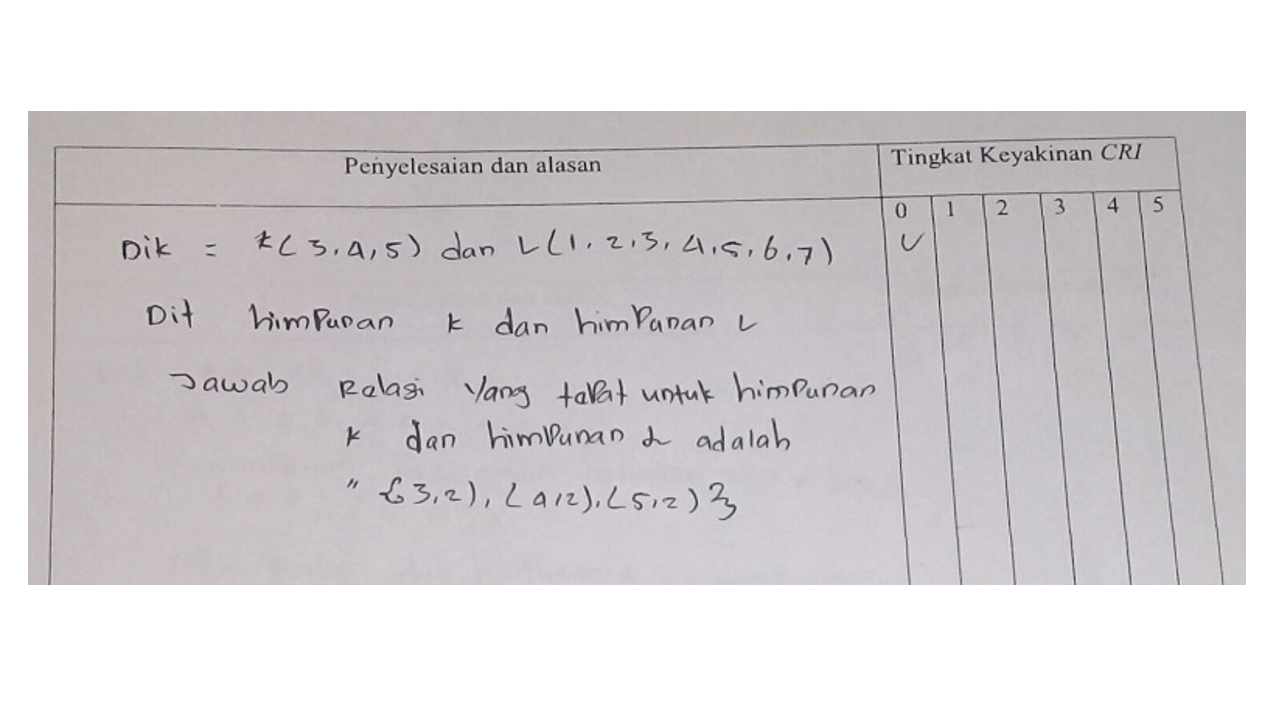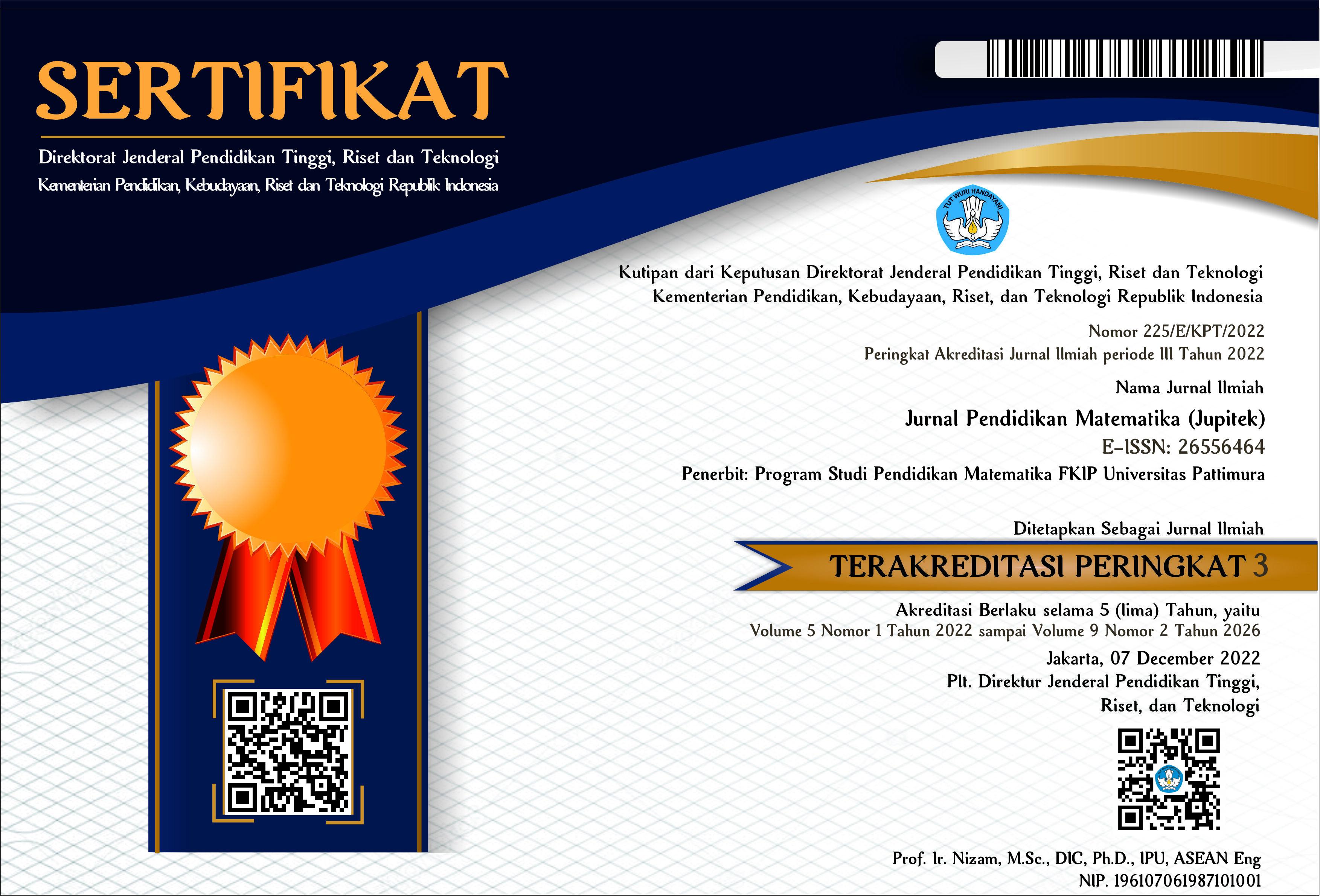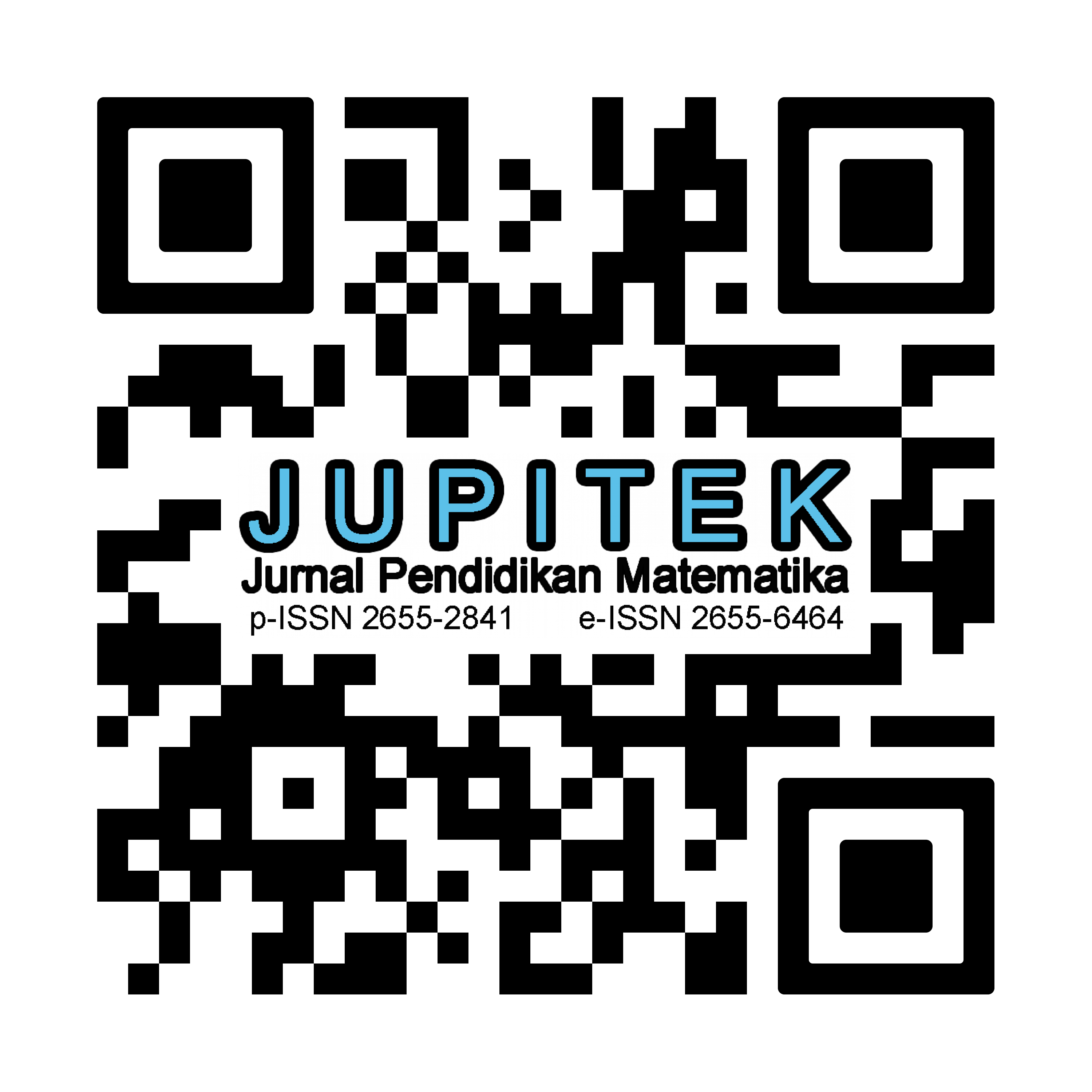ANALISIS KESULITAN SISWA DALAM MENYELESAIKAN SOAL RELASI MENGGUNAKAN CERTAINTY OF RESPONSE INDEX (CRI)
Abstract
Penelitian ini bertujuan untuk mengetahui bentuk-bentuk kesulitan siswa dalam menyelesaikan soal relasi berdasarkan kriteria Certainty of Response Index (CRI) yaitu siswa yang tidak paham konsep (lucky guess), tidak paham konsep (a lack of knowlegde) dan miskonsepsi. Penelitian diskriptif kualitatif ini menggunakan metode tes dan wawancara untuk memperoleh data bentuk kesulitan, siswa sebagai subjek penelitian adalah siswa kelas VIII yang telah mempelajari materi relasi. Hasil penelitian menunjukan bahwa sesuai kriteria CRI, tentang paham konsep lucky guess terdapat 11 kesulitan, terdapat 10 kesulitan pada bentuk paham konsep namun menebak dan tentang miskonsepsi terdapat 14 jenis kesulitan. Jenis kesulitan dalam memahami prinsip, kriteria CRI paham konsep (lucky guess) terdapat 9 kesulitan, pada kriteria paham konsep namun menebak (a lack of knowlegde) terdapat 9 kesulitan dan kategori miskonsepsi terdapat 18 kesulitan
Downloads
References
Bahtiar Sjarif (1990). Pengantar Dasar Matematika. Fakultas MIPA, ITB. Bandung.
Dewi, N. K., Untu, Z., & Dimpudus, A. (2020). Analisis Kesulitan MenyelesaikanSoal Matematika Materi Operasi Hitung Bilangan Pecahan Siswa Kelam VII. Primatika: Jurnal Pendidikan Matematika, 9(2), 61-70.
Febrini, (2017). Psikologi Pembelajaran Yogyakarta: Pustaka Belajar. Jakarta: Rineka Cipta.
Hasan, S., Bagayoko, D., & Kelley, E. L. (1999). Misconceptions and the certainty of response index (CRI). Physics education, 34(5), 294-299.
Hutami, D. P. N. (2018). Analisis Miskonsepsi Siswa Dalam Menyelesaikan Soal Barisan Dan Deret Berdasarkan Certainty of Response Index (Cri) Ditinjau Dari Gaya Kognitif Reflektif Dan Impulsif.
Lithner, J. (2011). University Mathematics Students’ Learning Difficulties. Education Inquiry. Vol 2 (2): 289-303.
Nurjana, S & Sujadi, A.A (2018). Analisis Kesulitan Siswa dalam Menyelesaikan Soal-Soal Program Linear pada Siswa Kelas X TKJ Smk Piri 2 Yogyakarta. Prosiding Seminar Nasional Pendidikan Matematika Etnpmatnesia.
Sari, & Surya, E. (2017). Efektivitas Penggunaan Teknik Scffolding dalam Meningkatkan Hasil Belajar Matematika pada Siswa SMP Swasta AL-Washliyah Medan. Education Jurnal Pendidikan Matematika, 7 (1).
Subini, N.D (2012). Psikologi Pendidikan Yogyakarta: Mentari Pustaka.
Sugiyono, (2015), Buku Metode Penelitian dan Pengembangan. Alfabate Bandung
Suparno, P. (2013). Miskonsepsi dan Perubahan Konsep dalam Pendidikan Fisika, Yogyakarta: Gramedia Widiasarana Indonesia.
Tayubi, yuyu. R (2005). Identifikasi Miskonsepsi pada Konsep-Konsep Fisika Menggunakan Certainty of Response Index (CRI).
Wafiyah, N. (2012). Identifikasi Miskonsepsi Siswa Dan Faktor-Faktor Penyebab Pada Materi Permutasi Dan Kombinasi Di Sma Negeri 1 Manyar. Gamatika. II (2): 128-138
Wigati Tri Utami. (2012). Jurnal Skripsi Identifikasi Kesulitan dalam menyelesaikan Persoalan Matematika yang berkaitan dengan Pecahan di kelas VIII SMP N 3 Ngaglik Sleman tahun Ajaran 2011/2012. Yogyakarta: Universitas Negeri Yogyakarta.
Yusmin, E. (2017). Kesulitan Belajar Siswa Pada Pelajaran Matematika (Rangkuman dengan Pendekatan Meta-Ethnogrphy). Jurnal Visi Ilmu Pendidikan. 9(1): 2123

Copyright (c) 2021 Margaretha E Kefi, Hermina Disnawati, Sulasri Suddin

This work is licensed under a Creative Commons Attribution-NonCommercial-ShareAlike 4.0 International License.
License and Copyright Agreement
By submitting a manuscript to Jurnal Pendidikan Matematika (JUPITEK), the author(s) certify and agree to the following terms:
- Originality and Authority: The submitting author is authorized by all co-authors to enter into this agreement. The manuscript describes original work that has not been published previously in a peer-reviewed journal, nor is it under consideration for publication elsewhere.
- Approval: Its publication has been approved by all author(s) and by the responsible authorities of the institutions where the work was carried out.
- Rights: The authors secure the right to reproduce any material that has already been published or copyrighted elsewhere.
- Licensing and Copyright: Authors retain the copyright to their work.
- License Grant: The authors grant Jurnal Pendidikan Matematika (JUPITEK) the right of first publication, with the work simultaneously licensed under the Creative Commons Attribution-NonCommercial-ShareAlike 4.0 International (CC BY-NC-SA 4.0).
- Self-Archiving: Authors are permitted and encouraged to deposit the published version of their article in institutional repositories, on their personal websites, and other academic platforms, with proper acknowledgment of its initial publication in Jurnal Pendidikan Matematika (JUPITEK).





.png)


